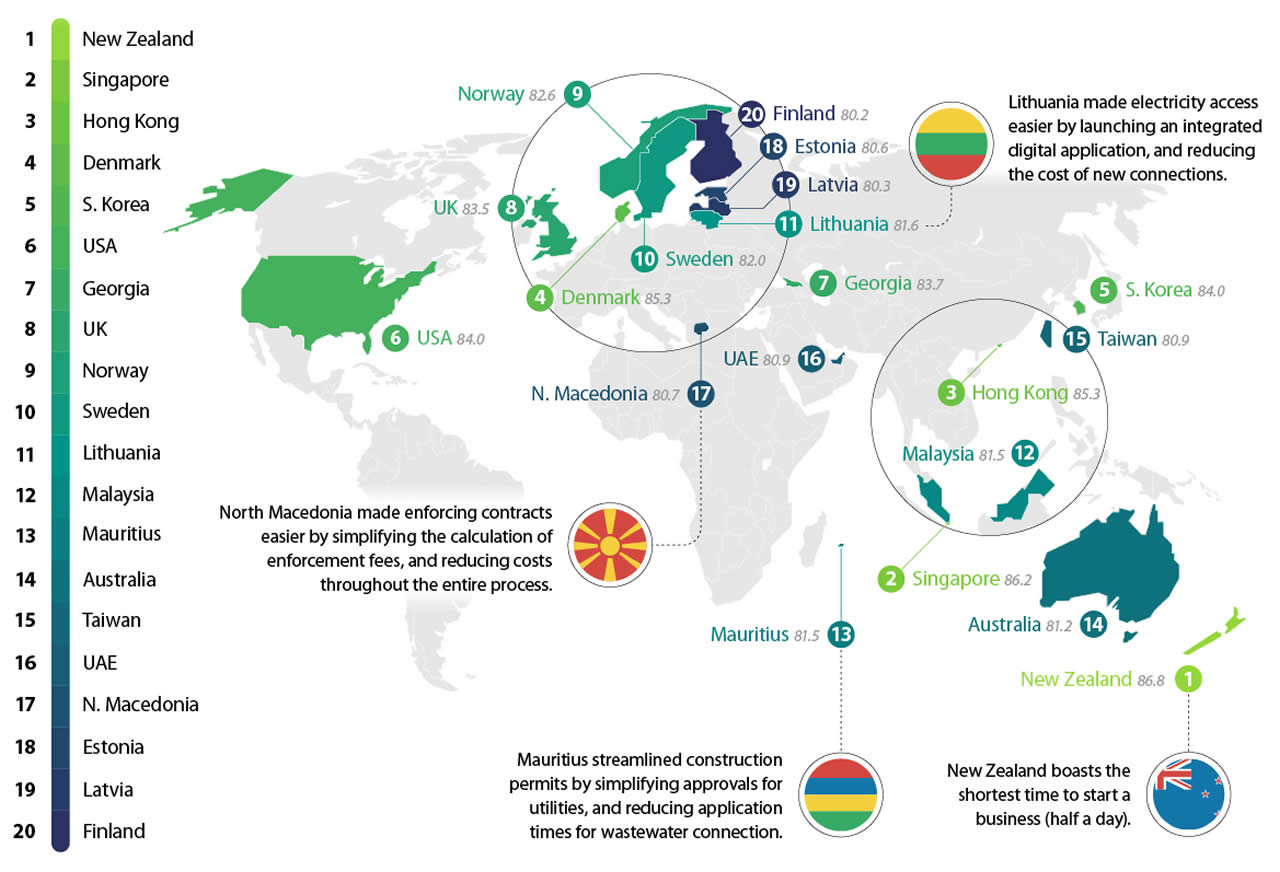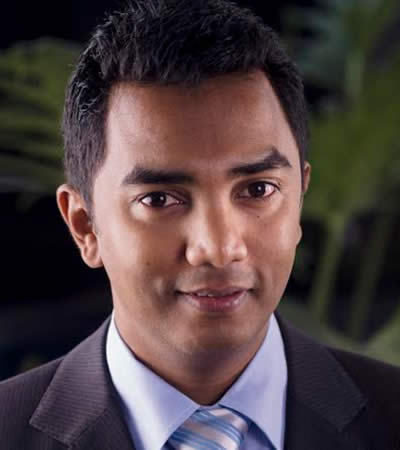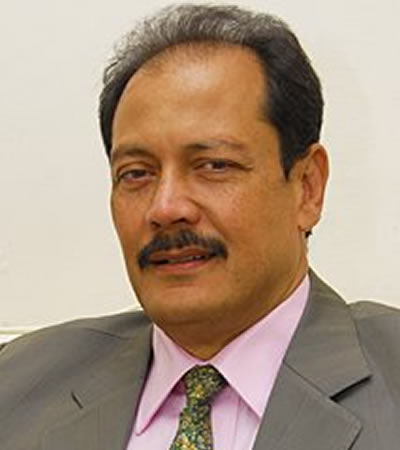
Mauritius has significantly improved its performance in the World Bank’s latest Doing Business 2020 Survey, moving from the 20th to the 13th position. The country also enjoys a prominent position in various other international rankings and remains unchallenged in Africa. But we have also dropped a few places in some surveys.
Publicité
When it comes to international rankings, Mauritius does not have serious competitors in Africa. In almost all rankings, Mauritius remains first in Africa, starting with the Mo Ibrahim Index of African Governance. Indeed, we have maintained our first position in this ranking since 2007. However, observers believe that we must stop comparing ourselves with our African peers, but rather dare to measure our performance against other giants.
The various international rankings serve as a barometer of the economic or social health of the country and are used in the country’s promotion exercises to attract investment or tourists. But investors do not always necessarily consider rankings when looking for a destination. There are many countries with poor performance in global rankings that are still able to attract significant foreign investment. Other determining factors are the availability of natural resources, the extent of the domestic market, and the viability of projects, among others.
Doing Business
This year, it was with surprise that Mauritius found itself raised to the 13th place in the World Bank’s Ease of Doing Business survey, while our best rank so far in the history of the ‘Doing Business’ was the 17th place we won in 2010. Last year, the country was at the 20th place, a position that Mauritius already occupied in 2011 and then again in 2014. The three main factors behind this spectacular rise this year are the improvement in the processing of building permit applications, the reduced time taken for the registration of property deeds and the simplification of insolvency proceedings.
Human Development Index
We continue to decline in the ‘Human Development Index’ and this year, we are at the 66th place. We dropped from the 64th place in 2017 to the 65th place in 2018. In 2016 we were at the 63rd position. In the past, in 2012, we were ranked 80th. Norway, Switzerland, Ireland, Germany and Hong Kong form the Top Five.
A.T. Kearney Global Services Location Index
From the 34th place last year, Mauritius this year regains the 30th place it occupied in 2016, on a list of 50 countries. This ranking is an important index of the ICT/BPO sector. Our best score was achieved in 2009, when we ranked 25th. The A.T Kearney Global Services Location Index measures the attractiveness of destinations for global outsourcing.
Global Innovation Index
Another drop in a ranking that measures innovation. We have moved from the 75th to the 82nd place on a list of 129 countries. In 2017, Mauritius was better ranked at the 64th position. In 2016, we were even higher, at the 53rd place. Our best performance, however, was in 2014, when we ranked 40th.
Index of Economic Freedom
We lost 4 places in this ranking by ‘The Heritage Foundation’ to land at the 25th position this year. In 2012 and 2013, we were in the Top Ten (8th place). The report says that “There is not a single ‘free’ economy in the region, and only Mauritius and Rwanda are counted among the ranks of the ‘mostly free’.”
Mercer’s Quality of Living Survey
This year, we maintain our 83rd place in the Mercer’s Quality of Living Survey, which compares quality of life across 231 global cities. In the past, our best ranking was 59th. Vienna tops the ranking for the 10th year running, closely followed by Zurich, the runner-up.
Press Freedom Index
This year, Mauritius loses two places in the Press Freedom Index. But our new 58th place out of 180 countries is still better than the 61st place of 2016 or the 62nd position of 2013. Norway is ranked first in the 2019 Index for the third year running while Finland (up two places) has taken second place from the Netherlands. On Mauritius, the report highlights that “Although seen as one of the model African countries regarding respect for human rights and democracy, journalists can be sentenced to imprisonment on a charge of offending public order. Amendments to the Information and Communication Technologies Act in 2018 significantly reinforced the legislative arsenal, providing for prison sentences for those who post content that could cause “inconvenience, distress or anxiety.”
Global Competitiveness Index
Have we become less competitive? We have lost three places in this ranking, to reach the 52nd position, out of 141 countries. In 2017, we were at the 45th place. But we were worse in 2010, when we ranked 57th. “The slow accumulation of human capital combined with low innovation capability may explain why Mauritius has not yet evolved into an innovation-led economy. Investment in Research & Development is insufficient and less capital-intensive aspects (i.e. university-companies collaboration) are limited, stifling the realisation of a functioning innovation ecosystem,” says the report.

Forbes Survey
We have made a slight improvement in the Forbes Survey of Best Countries for Business this year, where we have gained two places to be in the 39th position, the same rank as 2017.
Global Peace Index
Mauritius ranks 24th out of 163 countries in the 2019 Global Peace Index. But we were better ranked last year, at the 20th place!
Travel & Tourism Competitiveness
The Travel & Tourism Competitiveness Report 2019, published by the World Economic Forum, ranks Mauritius 54th out of 140 countries surveyed. The report highlights that travel to Mauritius has been made easy by minimal visa requirements, high quality tourism infrastructure and fairly good ground and port infrastructure. Moreover, the country far outscores the rest of sub-Saharan Africa on the Health and Hygiene pillar due to the number of physicians, hospital facilities, and water and sanitation services that are available to the population. However, despite ranking high for the attractiveness of its natural assets, including beaches, reefs and mountain rainforests, Mauritius still scores low on the Natural Resources pillar. The country needs to reverse its recent decline in this area by expanding the amount of protected area and protecting the large number of threatened wildlife that live in the country or it may risk losing its competitive edge. In addition, the country needs to keep improving its unfavourable price competitiveness to enhance its attractiveness to potential visitors.
 Arvind Nilmadhub : “Everything seems perfect on paper, but ....”
Arvind Nilmadhub : “Everything seems perfect on paper, but ....”
Economist Arvind Nilmadhub argues that international rankings are based on surveys and assessments carried out by international bodies with local institutional leaders and business stakeholders based on our reforms in laws and procedures. But a good ranking does not necessarily mean that the system is perfect. “Regulation can be excellent on paper, but obstacles can still exist in the real world. There isn’t enough monitoring and post-control exercises to ensure all public institutions are well aligned on business facilitation vision and whether systems are working perfectly,” says the economist. He makes a further observation on online services. “There is a tendency to computerise a manual procedure without even reviewing and streamlining the procedure to eliminate unproductive steps that make no sense. With IT, the system should be lighter and more efficient, and not a carbon copy of the manual system,” says Arvind Nilmadhub.
 Nushrin Shadoo Buccus : “A remarkable achievement captures the mind forever”
Nushrin Shadoo Buccus : “A remarkable achievement captures the mind forever”
A young graduate in psychology, Nushrin Shadoo Buccus states that a country ranking higher in a global listing sends a positive image, not only to tourists or foreign investors, but also to the local population who feels valued. “It creates a sense of peace, comfort and trust. It is therefore important to try to achieve the best possible rank,” says the psychology graduate. She believes that, while a global ranking may not be the main factor to choose a destination, as many people would not even know about the existence of such rankings, a good performance on the international level is nevertheless a major plus point, and when a remarkable one is achieved and widely mediatised, such as being first, being in the Top 10 or Top 15, this creates a stronger hype that the mind retains forever. However, she relates that the hardest part is to maintain the good performance or further improve it. “Those who fare average do not feel the pressure. But a country who has achieved an excellent result cannot afford to perform any lesser again. For example, we ranked 13th in Doing Business. Thus, there is a huge burden on officials to keep that level,” she says.
 Gerard Sanspeur : “The best performance of Mauritius in terms of competitiveness was in 2008”
Gerard Sanspeur : “The best performance of Mauritius in terms of competitiveness was in 2008”
Gerard Sanspeur, former economic adviser at the Ministry of Finance and former chairman of the Economic Development Board (EDB) explains that the Doing Business Survey allows us to compare ourselves with other countries but only in terms of regulations in the conducting of business. However, he believes the Global Competitiveness Report is just as important. “This report ranks Mauritius 52nd this year. But the best performance of Mauritius in terms of competitiveness was in 2008,” he reveals.

Notre service WhatsApp. Vous êtes témoins d`un événement d`actualité ou d`une scène insolite? Envoyez-nous vos photos ou vidéos sur le 5 259 82 00 !























